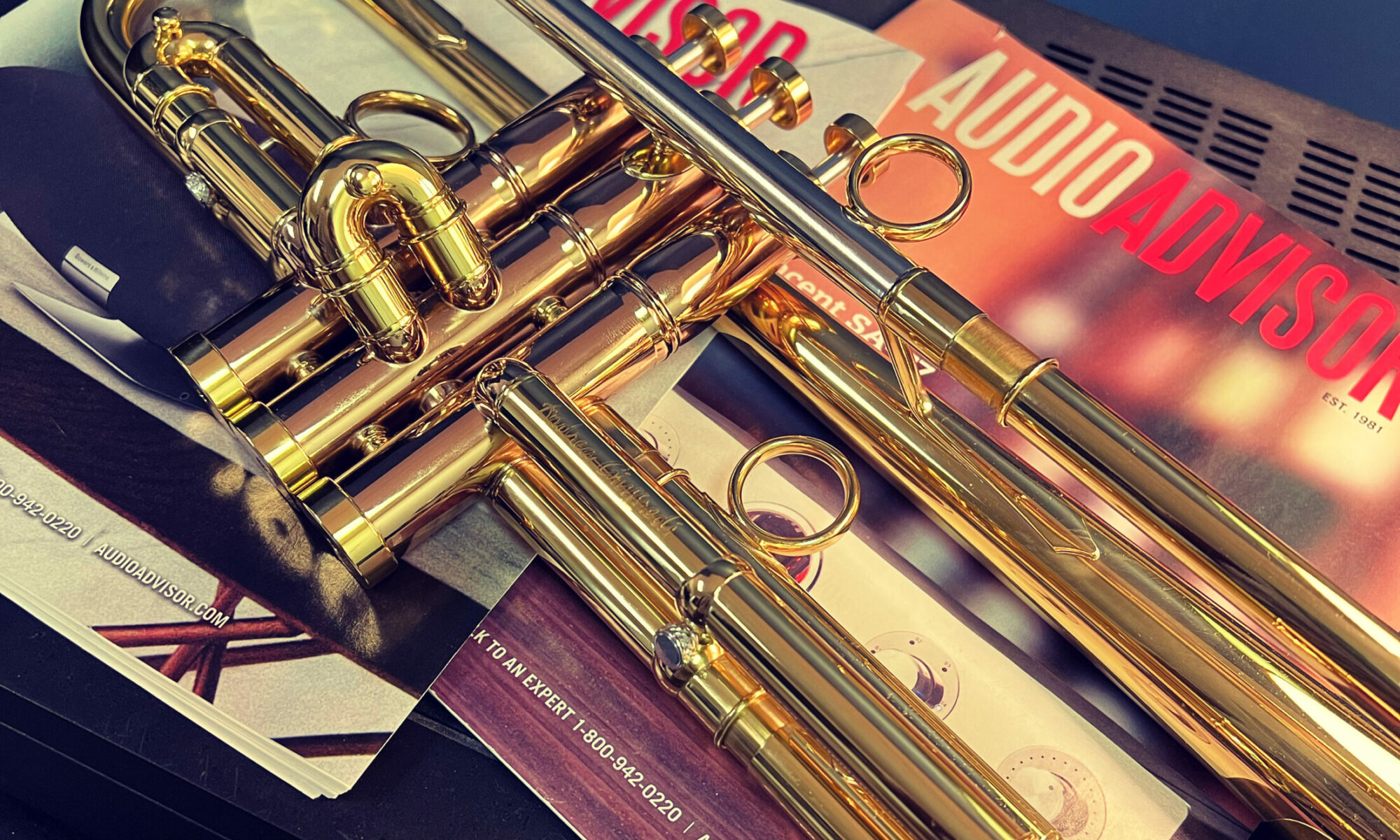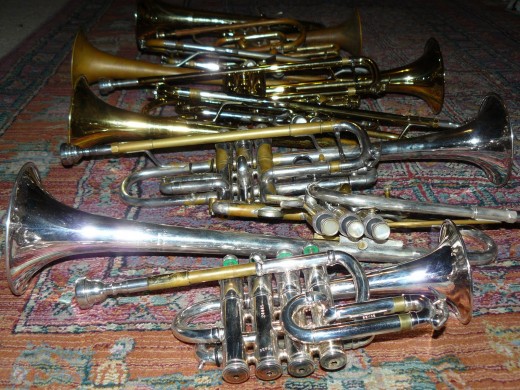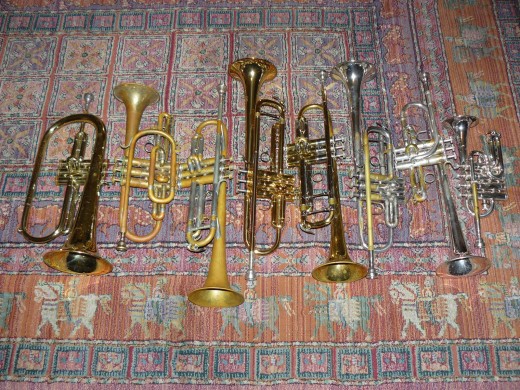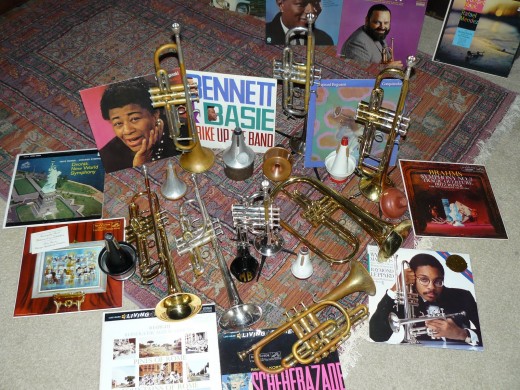It’s time for a new website! Look for updates and changes coming daily as I get used to the new format. A special thanks to Christian Mogensen at Squadron 7 for his custom web design and support. Feel free to post any comments or feedback-I’d appreciate it. Thanks for visiting!
Time to change your practice routine!
I’ve realized over the past couple weeks that I am long overdue for changing the material in my practice rotation. It’s always a good idea to “switch it up” every three to six months, so that you keep your mind, chops, and fingers fresh. Too often I forget, only to find my playing on a plateau (or in a little rut) for a few weeks. Finally, something hits me and the light bulb goes off. Time to find something new to practice!
So, I’ll say goodbye to Clarke, Irons, and Charlier and hello to Gekker, Colin, and Bousquet.
Happy New Year!
One of the greats: Adolph Herseth
Here’s a few YouTube videos of one of my all-time favorite trumpet players. Few trumpet players can approach the level of musicianship that Bud established.
http://www.youtube.com/watch?v=Qeqlg6McDBQ&feature=player_embedded
Valve Oil
It seems these days there are as many brands of valve oil as there are trumpets. Each one claims you’ll experience record valve speed. Some will clean your horn for you. Some smell like jet fuel while others smell like roses. You may turn in to an environmental steward if you buy brand “X”. Want lime green colored oil? No problem. Do you like blue? Good. What shade do you want? How about oil with no oil in it?
I say all of this is hogwash. Trumpet players are gullible. We buy all kinds of stuff with the hopes of finding the “magic bean”. I’m guilty like all other trumpet players. I have seven different brands of valve oil on my shelf right now. Having tried all seven oils (plus many more over the years) I’ve finally come to a realization:
It’s VALVE OIL folks. Keep your horn clean, oil your valves regularly, don’t drink the valve oil, etc. and your valves will work fine.
Staying true to “if it ain’t broke, don’t fix it” mantra I’ve found that Holton makes a fabulous valve oil. Holton’s Electric Oil has been around since 1907. It’s clear. It smells like lamp oil mixed with rocket fuel. It doesn’t clean my horn. It’s under three bucks a bottle. It says “HOLTON” on the bottle. My valves work as well or better than they ever have.
Seems like they got it right in 1907……………………..
Trumpets Anyone?
Find time to play with great players
Successful trumpet playing is easier if you have a great model to follow. Putting yourself in situations where you can play with high level musicians is one of the fastest ways to conceptualize and reinforce many aspects of making music.
I’ve found recently that sitting in an orchestra section has re-opened my eyes (ears) to what great articulation, a resonant sound, and leadership can do for trumpet playing. This weekly reminder has helped me with some aspects of my playing that I have let slide over the last few months to a year.
There are dozens of other concepts to learn while playing with a great player. Style, dynamics, control, balance, blend, intonation, and pace are just a few of them.
Take a lesson, play some duets, or “zero-in” on the principal of your section the next time you have rehearsal. I guarantee you’ll learn something to incorporate into your own playing.
Mouthpiece Buzzing Anyone?
I am way overdue for a new topic. It suddenly occurred to me (as I sit at my computer at 1:00am) that I am buzzing my mouthpiece. I started to wonder why I was doing it and realized it would be a good topic, so here goes.
There seems to be a love/hate relationship with trumpet players regarding mouthpiece buzzing. I know some people who absolutely swear by it, insisting that it is paramount in their success with the trumpet. Others have told me that it couldn’t be a better waste of time. While I think I can see why some feel it’s a waste of time, I find myself in the “it’s useful” camp. It certainly helps me in a few key areas:
1. Focusing the “buzz” for maximum efficiency and immediacy.
I find that buzzing a steady pitch very softly with a breath attack brings my lips together in the optimal playing position. I find if I am doing this on a somewhat regular basis (a few minutes a few times a week) I can start (or stop) notes with virtually no effort. For me, the less effort required to start a note, the less effort required to sustain the note (better efficiency = better endurance). Immediacy increases greatly as well, meaning easily starting and stopping notes at a lower dynamic. I suppose that efficiency and immediacy could be one in the same, or you could call this technique “finding balance” on the most fundamental level. It depends on how you look at it.
2. Continuity of air stream.
Mouthpiece buzzing has helped me with my air usage as well. Being able to hold a steady pitch (on the mouthpiece) has more to do with air than anything else. I also listen and feel for disturbances in the air stream when doing slow interval slurs. If the balance is right there will be no pitch, volume, or tone fluctuation while performing a slur. Exaggerated crescendo/decrescendo exercises on long tones expose air issues too.
3. Quality of sound.
Purity and richness of sound can be affected by mouthpiece buzzing. After doing some soft buzzing (as discussed under #1) my sound has a greater presence of overtones. Move overtones gives your sound more color and projection, adding to playing efficiency. Listening to the actual sound of the buzz can help too. I believe the more buzz sound (or tone) and the less “air” sound a person has, the purer the trumpet sound will be. The “air” sound means that some part of the embouchure is not buzzing efficiently (or not at all). This contributes to the distortion (or “junk” as I call it) in the center of a trumpet sound. Listen to the sound of other players. Chances are good that you will hear it to some degree or another. One of the greatest examples of a pure sound is Bud Herseth. Find a video clip of him buzzing his mouthpiece. It’s all buzz and no air. I don’t know if Bud practices mouthpiece buzzing, but I certainly think there’s a relationship of having a pure mouthpiece sound and a pure trumpet sound. If practicing mouthpiece buzzing gives you a better buzz………………….
The Sound of the Trumpet
A trumpet is identified by the sound it produces. There’s nothing else in the world, natural or man-made, that sounds like a trumpet. It’s also one of the easiest instruments for the everyday public to identify. Due to this and the fact that the trumpet plays a prominent and/or leading role in most ensembles it is imperative that quality of sound be of the highest priority for any trumpeter.
A select few of us are lucky enough to produce a beautiful, resonant sound without even trying. These people can put most of their focus toward something else while the rest of us spend a good deal of time working out different aspects of a good trumpet sound. For most situations, a good trumpet sound will possess qualities such as brilliance, clarity, depth, core, and projection. While each trumpet player works on various exercises (pedal tones, long times, breathing methods, soft and loud playing, etc.) to enhance the qualities they are looking to produce, having a vivid mental sound concept may be the most important. It is for me.
Take the time to immerse yourself in the sound of your favorite players. Listening to great trumpet sounds will cultivate a sound concept of your own, which will eventually find its way out of your bell. Listening will do as much for your sound as playing exercises, provided that your ear is critical enough when examining your own sound. The brain and ear working together really go a long way to promoting growth as a player. A “trumpet friendly” practice room and a recording device will help your ear do its job more effectively. I could discuss trumpet sound behind the bell versus out in front and how that can trick the ear, but that’s a topic for another day.
Attending Live Performances
Attending a live performance is something beneficial to any musician. It rejuvenates the soul and serves as a great learning tool. I find that I regain motivation to excel, whether in practice or performance (or both). Hearing a different concept on familiar repertoire can shed new light on an old workhorse. Even after studying and performing the Haydn and Hummel concertos for seven years, I’ve found new ways to approach these pieces after hearing then performed by Alison Balsom. Witnessing the way the London Symphony Orchestra’s woodwinds play together or how Wynton Marsalis works an audience is inspiring and educational. Hearing Wayne Bergeron get seemingly stronger through a two hour concert boggles the mind!
Live performance is also the best way to experience the emotion of music. I’ll never forget the first time I heard the Chicago Symphony perform an all Wagner show. I was riveted to my chair, unable to move until the concert was over. That feeling cannot be duplicated anywhere. You not only feel the emotion of the music, but also the emotion of the music as performed through the musicians on stage. Combining a major work with a world-class performing ensemble is a recipe for one of life’s great experiences.
I’ve had the good fortune of hearing many great ensembles and performers, and while it has cost me a small fortune to attend the dozens of concerts I wouldn’t trade it for anything. Everyone has different priorities, but if getting the chance to hear one of my favorite groups means I have to eat peanut butter and jelly for a week, I’ll do it every time!
What should I practice?
Many of my students have asked me this question: “What should I practice?”
While my response does vary a bit given each particular student’s needs, I do have a basic methodology of practice material. I try to teach my students that mastery of the instrument comes before focusing on a particular type of playing. I find the “classical” approach to practice is the quickest route to gaining an overall facility of the trumpet.
To answer the above question, I’ll give a generic example of the practice routine I use for my students. I also follow the same basic form for my own practice.
- Fundamentals (50 to 70% of your total practice time and in no particular order)
- Mouthpiece buzzing
- Long Tones
- Articulation
- Scales (major, minor, diminished, blues, whole-tone)
- Lip Slurs
- Finger/air/embouchure coordination
- Tuning/Arpeggios
- Dynamics
Recommended methods: Arban, Clarke, Irons, Schlossberg, Goldman, Rubank, Boyde Hood mouthpiece routine, Cichowicz long tones, Tune Up, Colin
- Flow studies and lyrical etudes (20 to 40% of your total practice time) Recommended methods: Concone, Bordogni, Rochut, Collins, Cichowicz, Arban, Charlier.
- Other etudes, solos, orchestral excerpts and studies, jazz studies, “fun stuff” (10 to 20% of your total practice time)
Recommended methods: Charlier, Bitsch, Veryne Reynolds, Brandt, Smith, Bousquet, Aebersold, Thomas, Arban, Clarke, Norris, Hickman, Sachse. “Fun stuff” is a catch-all category that can be any material or piece that a student wishes to play. I encourage students to play “fun” music at least a couple times a week. (The occaisional junk food instead of the constant meat and potatoes!) This can remind a student why we are doing all of the tedious and sometimes monotonous material.
- Duets
Recommended duet books: Arban, Amsden, Bower, Gekker, Rubank, etc. I highly encourage playing duets whenever possible. Duets address the skills of intonation, style, balance/blend, and sight-reading. - Rest
I advocate resting as much as you practice. Rest can be physical, mental, or both. Muscle fatigue is an obvious sign for taking a break. Practicing on tired chops is generally useless, as bad habits can be easily formed. A lack of concentration is often overlooked as being important. It is equally pointless to practice without mental focus; 15 minutes of focused practice is better than an hour of inattentive practice.
I’ll close with an excellent quote that sums it all up:
“Intellect in the practice room or studio gives you the tools to use your heart on stage.”
-Manny Laureano



